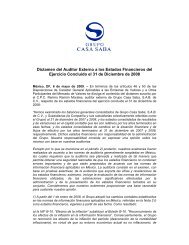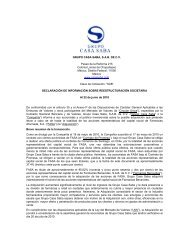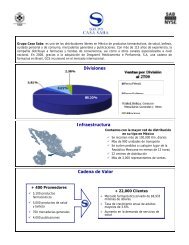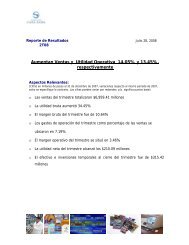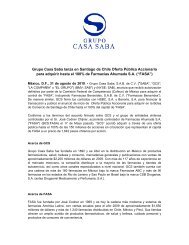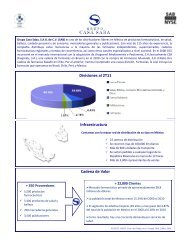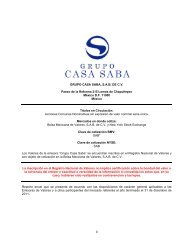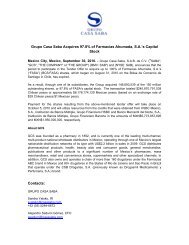FORM 20-F Grupo Casa Saba, S.A.B. de C.V.
FORM 20-F Grupo Casa Saba, S.A.B. de C.V.
FORM 20-F Grupo Casa Saba, S.A.B. de C.V.
Create successful ePaper yourself
Turn your PDF publications into a flip-book with our unique Google optimized e-Paper software.
Table of Contents<br />
●<br />
●<br />
●<br />
●<br />
a minimum trading price of its securities;<br />
a minimum of 12% of the capital stock held by public investors;<br />
a minimum of 100 hol<strong>de</strong>rs of shares or of shares represented by ADRs who are <strong>de</strong>emed to be public investors un<strong>de</strong>r the General CNBV Rules; and<br />
complied with certain corporate governance requirements.<br />
The CNBV has the authority to waive some of these requirements in some circumstances.<br />
Last year, the General CNBV Rules were amen<strong>de</strong>d in or<strong>de</strong>r to inclu<strong>de</strong> the obligation to disclose only to this authority the names and number of shares of the<br />
stockhol<strong>de</strong>rs of a security market participant.<br />
The Mexican Stock Exchange will review annually compliance with the foregoing and other requirements, some of which may be further reviewed on a quarterly or<br />
semi-annual basis. The Mexican Stock Exchange must inform the CNBV of the results of its review and this information must, in turn, be disclosed to investors. If an issuer fails to<br />
comply with any of the foregoing requirements, the Mexican Stock Exchange will request that the issuer propose a plan to cure the violation. If the issuer fails to propose such plan, if<br />
the plan is not satisfactory to the Mexican Stock Exchange or if the issuer does not make substantial progress with respect to the corrective measures, trading of the relevant series of<br />
shares on the Mexican Stock Exchange will be temporarily suspen<strong>de</strong>d until the situation is corrected. In addition, if the issuer fails to propose the plan or ceases to follow such plan<br />
once proposed, the CNBV may suspend or cancel the registration of the shares. In such event, the issuer must evi<strong>de</strong>nce the mechanisms to protect the rights of public investors and<br />
market in general.<br />
Issuers of listed securities are required to file unaudited quarterly financial statements and audited annual financial statements as well as various periodic reports with<br />
the CNBV and the Mexican Stock Exchange. Pursuant to the General CNBV Rules, the internal regulations of the Mexican Stock Exchange must be amen<strong>de</strong>d to inclu<strong>de</strong>, among other<br />
things, the implementation of the Sistema Electrónico <strong>de</strong> Envío y Difusión <strong>de</strong> Información, or the SEDI, an automated system for the electronic transfer of the information required to be<br />
filed with the Mexican Stock Exchange, which will be similar to, but will replace, the existing Sistema Electrónico <strong>de</strong> Comunicación con Emisores <strong>de</strong> Valores, or EMISNET. Issuers of<br />
listed securities must prepare and disclose their financial information by a Mexican Stock Exchange-approved system known as the Sistema <strong>de</strong> Información Financiera Computarizada,<br />
or Computerized Financial Information System, commonly known as the SIFIC. Immediately upon its receipt, the Mexican Stock Exchange makes that information available to the public.<br />
The General CNBV Rules and the internal regulations of the Mexican Stock Exchange require issuers of listed securities to file through the SEDI information on the<br />
occurrence of material events affecting the relevant issuer. Material events inclu<strong>de</strong>, but are not limited to:<br />
●<br />
●<br />
●<br />
●<br />
●<br />
●<br />
●<br />
●<br />
the entering into or termination of joint venture agreements or agreements with key suppliers;<br />
the creation of new lines of businesses or services;<br />
significant <strong>de</strong>viations in expected or projected operating performance;<br />
the restructuring or payment of significant in<strong>de</strong>btedness;<br />
material litigation or labor conflicts;<br />
changes in divi<strong>de</strong>nd policy;<br />
the commencement of any insolvency, suspension or bankruptcy proceedings;<br />
changes in the directors; and<br />
102



